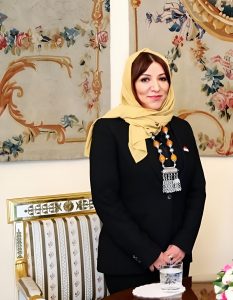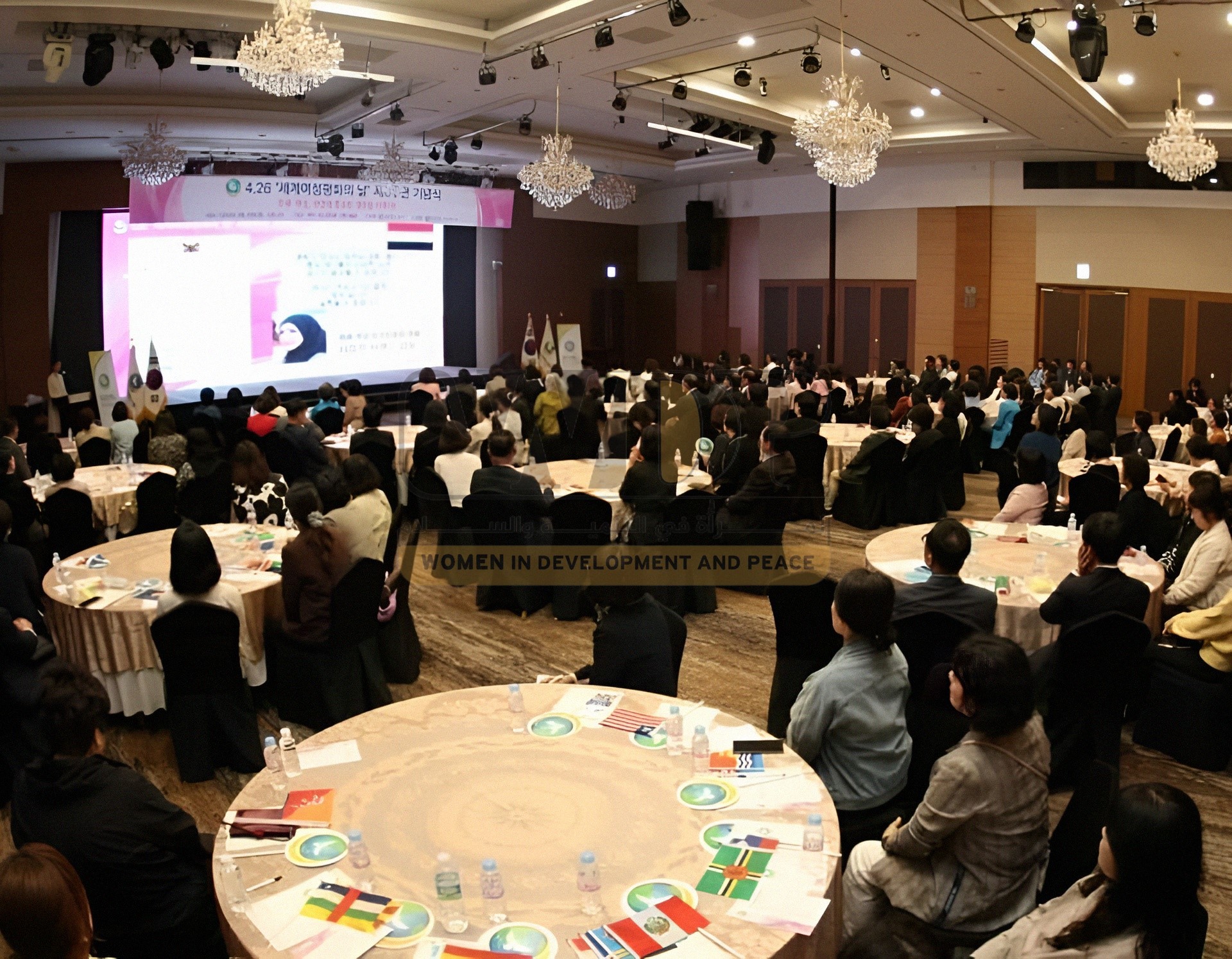Women in Development and Peace – Afrah Borgi & Hebah Mohammed
Yemeni women have a distinguished presence in the diplomatic corps over the years, and tireless efforts to enhance their role in international decision-making. Despite the challenges and obstacles, Yemeni women continue to prove their strong presence in various local and international fields, including the diplomatic corps.
Under the current circumstances, Yemeni women participate in varying proportions in different sectors, leaving a fingerprint on the nation’s building and progress. In the diplomatic field, Yemeni women represent a relatively small percentage, but they present an honorable model of the competence and diplomatic skills that Yemeni women possess and have proven themselves in.
Yemeni women are striving to enhance their participation in decision-making, believing in their active role in creating positive change at all levels. One of the most important achievements of Yemeni women in the diplomatic field is the appointment of several women to high-ranking diplomatic positions, such as ambassador and permanent representative to international organizations, and their active participation in various international conferences and events, including UN summits, and their contributions to conflict resolution and peacebuilding in Yemen.
 Dr. Mirfat Magli, Yemen’s ambassador to the Republic of Poland, emphasizes to the newspaper “Women in Development and Peace” the importance of the role of Yemeni women in the diplomatic field and the need for their equal participation with men in decision-making.
Dr. Mirfat Magli, Yemen’s ambassador to the Republic of Poland, emphasizes to the newspaper “Women in Development and Peace” the importance of the role of Yemeni women in the diplomatic field and the need for their equal participation with men in decision-making.
The Yemeni ambassador says: “In fact, there are important roles for women’s participation in the diplomatic field. For example, we now have three female ambassadors heading diplomatic missions.”
Magli continues: “Compared to previous periods, the representation did not exceed one ambassador, in addition to the presence of a large number of female diplomats working in diplomatic missions at various diplomatic levels. This is due to the increasing social and political awareness of the importance of women’s role in administrative and diplomatic work, and their proving their ability to manage.”
Magli adds: “The importance of Yemeni women lies not only in diplomatic work but in all sectors and institutions of the state. Let us not forget that decision-makers have a major role in giving women the opportunity they deserve in political, diplomatic, and administrative participation, in line with what the parties agreed upon in the outcomes of the comprehensive national dialogue, which emphasizes that women’s representation should be 30% in all state facilities, which all women are working to prove and achieve in all sectors of the state.”
Women’s Participation Rates
Dr. Magli highlights the importance of the family’s role in encouraging their daughters to continue their education and work in all fields, in addition to working on raising awareness in society about the importance of women’s active role in contributing to achieving peace, building, and development, and the necessity of their involvement in all state institutions and different structures.
Despite all these positive indications, Dr. Mirfat Magli says: “Women in our country, and many Arab and international societies, are still struggling to obtain fair opportunities based on their capabilities and scientific and practical abilities; Yemeni women face many challenges, but with their determination and perseverance, they have overcome many of those challenges and achieved many opportunities.”
According to the World Bank’s blogs in 2013, the levels of women’s participation at the level of representative councils for the House of Representatives, confirms that there was no representation of women in the Yemeni Parliament (House of Representatives) in the last parliamentary elections; as the percentage of women reached 301 members out of men, only one woman’s membership, and when she died in 2015, the House of Representatives became devoid of women.
According to a study issued in 2019 titled (Arab Women and Membership; from Representation to Activation), confirmed that the latest statistics of the Inter-Parliamentary Union showed that Yemen has the lowest percentage of women’s representation in representative councils in the world, at a rate not exceeding 3%, and the percentage indicates the extent to which Yemeni society marginalizes the role of women in the diplomatic corps and decision-making.
An Unsatisfactory Reality
Studies and reports indicate that Yemen is witnessing positive steps, but weak, towards strengthening the role of women in diplomatic work; as the number of Yemeni female diplomats is witnessing a noticeable increase.
“The number of Yemeni female ambassadors has reached 16 women, holding the rank of ambassador, three of whom hold the positions of heads of diplomatic missions. The Yemeni Ministry of Foreign Affairs also includes 133 female diplomats out of 947 employees, representing a percentage estimated at 14%. Although this percentage is still below the desired level, it indicates a positive trend towards enhancing women’s participation in this field, as these statistics confirm that Yemeni women are now participating effectively in various fields, especially in the diplomatic field.” This is according to what Ambassador Magli stated.
Magli also points out that women’s struggle to obtain their rights is still ongoing. Looking at the status of Yemeni women globally, we find that there are goals that they have been able to achieve. For example, there were only four women, out of 850 delegates, who signed the United Nations Charter in 1945, and currently, there are only about 16 women at the top of the diplomatic work in the world who hold the position of head of state out of 193 countries, and women hold the position of foreign minister at a rate of 25% worldwide.
The Impact of Reality on Women’s Participation in Diplomatic Work
According to a 2024 report by Al-Sharq Al-Awsat titled “Empowering Yemeni Women: Vast Aspirations Collide with the Catastrophic Reality,” some Yemeni women have been given opportunities for political and economic empowerment, while the conflict has doubled the suffering of the majority of them and deprived them of their gains, which had begun before the armed conflict. This conflict has further marginalized women politically and economically and increased violence against them.
An Arab study found that there are no legal or legislative problems in empowering Yemeni women to obtain political, economic, and social rights. The only thing needed is political and societal awareness about the importance of women’s role, considering them an active element that serves the country at the international level in the process of achieving peace, security, and stability in Yemen.
International Women’s Day in Diplomacy
Regarding the importance of International Women’s Day in diplomatic work, Dr. Mirfat Magli pointed out that this day is a tribute to women and their role in political and diplomatic life. Through diplomatic work, all internal issues related to Yemeni affairs are raised in the corridors of decision-makers in international forums.
She stressed that the importance of this day comes not only from being a celebration of women but also because it highlights women’s successes in a number of fields and provides space to discuss the reasons for failure in many other fields related to women’s empowerment.
Dr. Magli said: “Women in diplomatic work are not only a mirror of their country’s foreign policy, but they also carry the issues and concerns of their society. Through their work, they mobilize all diplomatic skills to obtain the greatest benefit for their country, especially women’s issues, despite the difficulties they face in our societies that have placed them in a narrow mold that does not express the real role they can play in building society and the nation.”
Mirfat Magli also noted that Yemeni women participated actively in the National Dialogue Conference, representing 30% of the conference members, and played an important role in formulating the conference outputs, especially regarding women’s and peace issues. They also participated in many rounds of peace negotiations, represented the government and civil society, and raised women’s and peace issues on the negotiating table.
Challenges Facing Yemeni Women in Diplomacy
Regarding the challenges facing Yemeni women, Magli said: “The role of women in diplomatic work is equal to their male counterparts, and everyone works side by side to promote the values of gender equality. There is no doubt that there is an imbalance in representation in terms of the number of female diplomatic staff. And the truth is that this is not only in our countries but also around the world.”
She adds: “This is a reflection of many issues that differ from one country to another, but in Yemen, there are many challenges that have helped to reduce the participation of women in diplomatic work, most notably the dropout of girls from education at an early stage, and issues related to some jobs that were believed to be the exclusive domain of men.”
Magli stressed that Yemeni women, with the support of the state leadership, are working to strengthen their position in terms of equality in the number of those joining diplomatic work. As for the legal aspect, this stage has been overcome in all laws in force for a long time.
The Role of Yemeni Women in Promoting the Peace Movement
Dr. Mirfat Magli says: “We must not forget the role of many non-governmental organizations and research centers that are working to promote peace. Yemeni diplomacy, through its daily work, participates in seminars, meetings, and gatherings held by organizations, and gives lectures to university students to explain the situation in our country and the importance of working together to restore comprehensive peace to the people of Yemen.”
Regarding the activities and programs carried out by Yemeni women in promoting the peace movement, Mirfat Magli confirms that Yemeni women have played an active role in the process of promoting peace, starting from their participation in the National Dialogue Conference and its decisions, through rounds of peace negotiations, in addition to their participation with non-governmental organizations in humanitarian fundraising campaigns, and holding art exhibitions to showcase the rich cultural heritage of Yemen.

